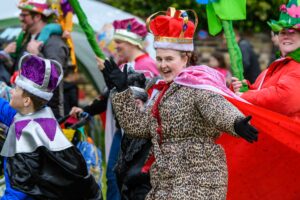From golden threads to golden crowns, Amy Finch looks at the recent evaluations and reports on events legacy that have come out of our funding.

How can events bring us together?: A recent evaluation and research round-up

Election periods are all about alternative visions for the country, dividing lines and what separates us within communities or one community from another. But with a summer of music festivals, international sports tournaments and community fetes ramping up, the political conversation can seem to be at odds with how people are actually spending their time together.
Our national ambition for events, launched in Warwick Business School’s Golden Thread report last week, explains their role in creating a shared vision of an inclusive progressive and confident UK.

The role of events in strengthening communities and bridging divides has been a key theme of our research and grant funding over the past two months. Jack Drum Arts’ evaluation of Year of the King describes how their Coronation parade developed into two intergenerational legacy groups, which according to participant Keziah has “definitely created a new community”. Do check out the videos as well as full report, which include participant tuned volunteer Pam explaining what the project meant to her after difficulties leaving the house due to her ME.
Where Jack Drum demonstrates powerfully how a relatively small NPO can become integral to the social life of a town, two further reports highlight how bigger arts institutions can build meaningful partnerships with community groups in ways that enrich the practice of everyone involved: Canley’s Playing Out report explains how Warwick Arts Centre and Canley Residents’ Association have work together to create an annual community parade, and the Maritime Museum’s evaluation of Windrush 75 events with the Caribbean Social Forum shows us the power of co-production. The term co-production has become ubiquitous in arts and culture, but these projects are examples of what it deliver at its best. In both cases, Spirit of 2012 grants were awarded once the relationships were already established, providing funding to take partnership work to the next stage with more ambitious activity. Of course organisations also need funding to reach out to new people as well as consolidate partnerships, but this was a reminder that funders shouldn’t always be chasing what’s new, but grant freedom to let things grow.
All three reports show community events at their very best – and are also worth checking out if you are wondering how to bring to life the impact of your project with both quantitative and qualitative information, alongside key learnings for future practice.
The last grant to finish this quarter was Shared Goals, an action-research project led by British Future, who worked with Huddersfield Town and Brentford to explore the role of football clubs in bringing people together from different cultural and religious backgrounds. The clubs produced video campaigns with fans to share their inclusive community message (watch: Huddersfield and Brentford). Football has a unique position as the most widely watched sport in the country to help create shared identities, and many of the recommendations in the report have potential to be picked up by other clubs, as well as looking ahead to hosting Euro 2028.
We’re currently working with Belong on how we can translate the insights form these projects and more into a really useful tool for community events to increase social cohesion. Please get in touch if you have ideas or would like to be more involved.
